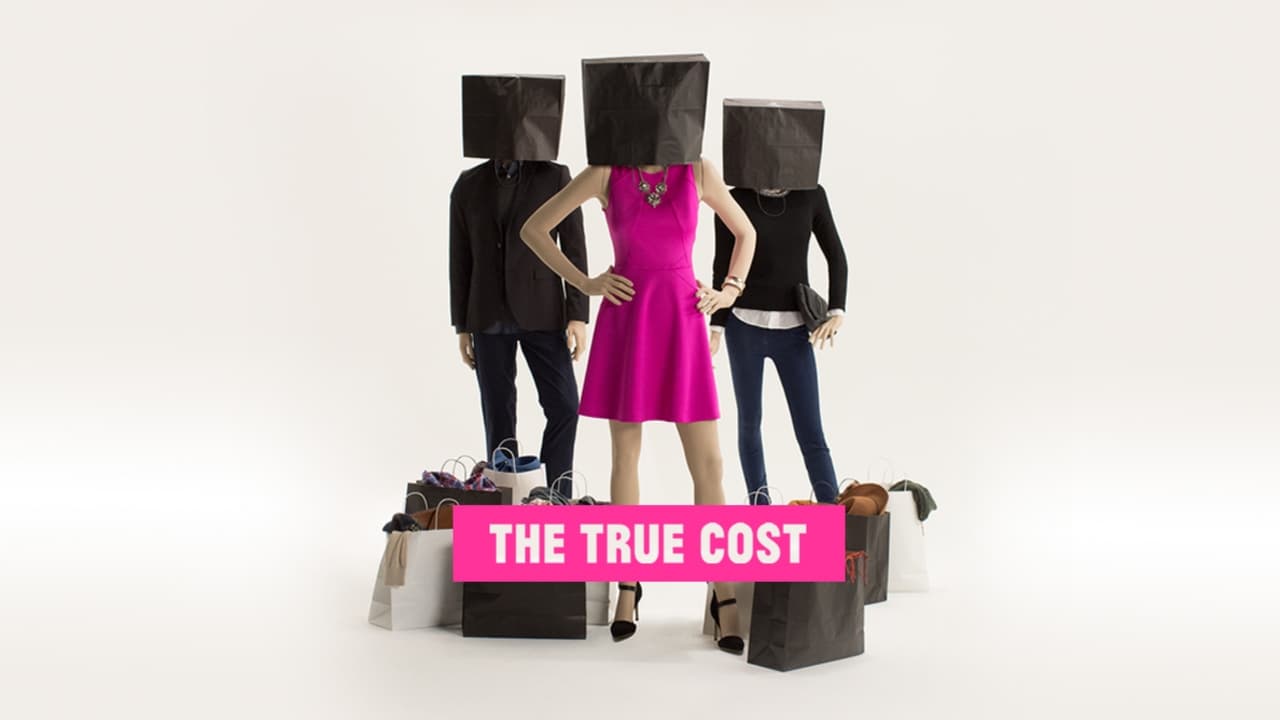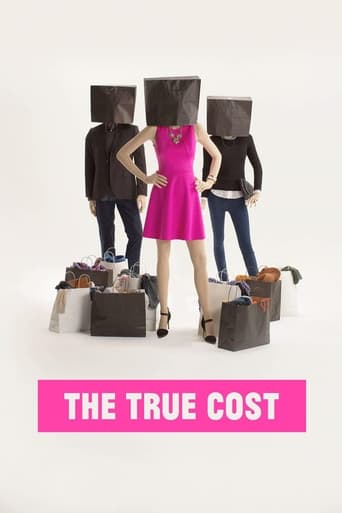



SERIOUSLY. This is what the crap Hollywood still puts out?
View MoreBetter Late Then Never
Very interesting film. Was caught on the premise when seeing the trailer but unsure as to what the outcome would be for the showing. As it turns out, it was a very good film.
View MoreThe acting is good, and the firecracker script has some excellent ideas.
View More"The True Cost" is a documentary by Andrew Morgan which explores the whole network of clothe's production and consume, unlatching the concept of fast fashion and his implications. Approaching the social and envirement impacts, the film shows the true cost of the fashion consume in this age, including the physical and psiquic ills caused by the chlote's production in poor countries without labor laws, ground's contamination caused by the agriculture required for the sector's industry and the social problems related to the economic policies and globalized production chain. The great problem of this film is the attempt to investigate all the issues intrinsic of the fashion cost. When treating multiple questions, the documentary ends up becoming a shallow investigation, without deepening and solidity. This desorganization is allied to a lack of interactions with the viewer and boring interviews, besides not including important social actors of the fashion production.
View MoreThis is an interesting documentary on the garment/fashion industry that is destroying the planet and people's lives. The film juxtapositions western consumerism and third world conditions, but not so much to drive the point as a Michael Moore film. It appears instead of buying clothes that will last we buy throw away items. The result is environmentally bad. Interesting to find out is that we also send so much donated items to Haiti, that we have ruined their local garment industry.The film also looks at farms, seeds, pesticides, and disease in the third world due to the garment industry. It pushes "Fair Trade" on us. Steven Colbert has replaced Noam Chomsky for commentary, for better or worse. The Stella McCartney train interview with shadows hiding an oddly tilted head should have been shot over. During the film a Bangladesh factory worker has supposed to visit London (?) and report back to the village about their customers. I expected that to be the climax of the film with her saying something poignant, but it never happened. Too much Stella McCartney.This was a three star production on a five star message. Was this a commercial for "Fair Trade?"Note to self: Jos. A. Banks is cheaper than paper towels.
View MoreTrue Cost is a honest, interesting and meaningful documentary about industry of clothing today and how simple everyday acts of greed and consumption can have devastating results in the lives of millions around the globe. Although it is not so much provoking, it is filmed by a certain distance but it makes direct comments for all the above subjects. In this film everything seems to be connected, from the fashion icons and clothing industry to the GMO cotton seeds made by one of the biggest profitable companies today and the terrible situations that labor workers face when they ask a raise of salary for their minimum and basic needs. The end credits was a clever ad which let us watch the director himself shooting with his camera in some of the places he visited for filming this documentary. Also, when a certain song with title "I want it all" starts to play in the scene where we watch people running like maniacs to buy whatever they catch on a Black Friday Day in U.S.A, it is completely in tune with the scene and shocking, it hits us in our gut how can people be so blind and to seek happiness or social success in materialism and consumption of things. Truth to be told, in the century we live in, we are accustomed to be accepted from the society for our looks or our social and economical level. There is a reference in Martin Luther King J. in the film, saying that "What America needs is a revolution of values". But this is more than America, it is global, and documentary has a hopeful message at the end, proposing that this situation might change in some years maybe and people start to think of other people and not of profits and money. As much as I doubt this assumption, it is of high importance that more films being made like this one, from respectable people that care enough to spread the truth all over the world, for people to see and realize what is the true imperative of humanity and human nature.
View MoreIn this examination of the clothing industry, director Andrew Morgan says that he knew nothing about the industry before embarking on making the movie. Maybe he offers that fact in support of initial objectivity to justify presenting an accumulation of damning evidence showing objectionable conduct in all components of the industry.In 2013 the spotlight was placed on the apparel industry in the aftermath of the of the Rana Plaza building collapse in Bangladesh where over 1000 workers died. The apparel industry was on the hot-seat after Rana Plaza and I wish there would have been discussion in this movie about how the brands using that building reacted to the event.A case is made that most of the evils of the industry are propagated by the desire to reduce the price point of all products, and this permeates all facets of the industry--all the way from cotton production, pesticide use, improper waste disposal, pollution of soil and rivers, factory conditions bordering on slave labor, and potential health issues. Cheap labor is seen as the driving force behind the fact that most all apparel manufacturing is now done in poorer countries. In 1950 over 95% of clothing sold in the United States was produced in the United States. Today that figure is 3%. It's hard to see how to break the vicious cycle of downward pressure on price--if a factory does not knuckle under to price demands, the companies blackmail them by saying that they will just go to a country that can meet their demands. Some of the industry executives in third world countries interviewed here say that having apparel factories in their country is a boon to them in that they offer some employment for people who would otherwise likely have no employment. The downside of capitalism is much on display here.Some statistics stood out for me: the average western consumer throws away 85 pounds of clothing a year (amounting to 11 million tons a year in the U.S.) and only about 10% of these are recycled. This means that much of this clothing winds up in mountains of waste that take years to biodegrade. And, yes, these mountains of waste mostly wind up in poorer countries. No mention is made of the environmental toll taken to ship clothes, both new and used, all over the world.Some relief from the downbeat tone is given by giving a nod to the few companies that are trying to buck the trend, like a Texas cotton farm producing organic cotton and some fair trade companies like People Tree. These small efforts offer the only optimism presented in the movie. Not all change needs to come from the industry, since consumers bear some responsibility. A more judicious approach to buying clothes is called for--the "wear once and toss" use is a part of the problem. Apparel consumption is up over 400% in the last couple of decades. Consumers are urged to cut back on their purchases and to recycle rather than toss. But, as evidence of how complicated it is to improve the situation, a cutback in consumer spending could ultimately make things worse by closing factories, resulting in more unemployed and more downward pressure on price.As long as consumers seek the lowest prices, and you can't blame them, this situation will continue until movies like this, and other educational efforts, provoke a consumer backlash against the main offenders. Another tipping point toward industry correction, beyond consumer awareness, could come when the collateral environmental damage reaches such crisis proportions that there is a citizen rebellion.Little mention is made of specific brands and their practices, perhaps for fear of legal actions. I wanted to know specifics. There were a couple of images of Levi's stores, implying guilt by association with the overarching negativity. I noticed that director Morgan was wearing a pair of Levi's. And Levi's was not operating out of Rana Plaza and I think they are more concerned about corporate responsibility than most brands. Knowing which brands are the best and which are the worst would at least provide some guidance for people to gravitate to the better brands. You would think that above all Nike would have been mentioned.It would be interesting to examine the true cost of almost any industry--the oil and gas industry is an obvious choice. Tracing the true cost of any manufactured good would be enlightening, like what it takes to manufacture a car, what it takes to support that car once it is on the road, and what happens when it has reached the end of its useful life. Or cell phones, or ... It's hard to leave this movie in a positive frame of mind.
View More